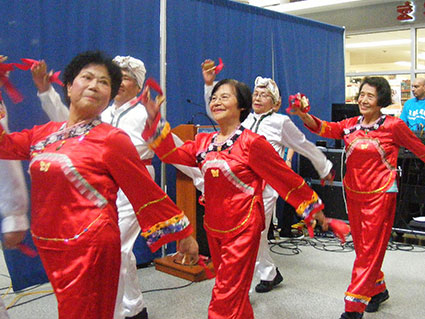| 图片: | |
|---|---|
| 名称: | |
| 描述: | |
- Taking AIM against stigma of mental illness

Recently, Toronto Western Hospital's Asian Initiative in Mental Health (AIM) held a 'Courage Lives Here' Mental Health celebration to recognize the efforts of clients, staff, families and community partners. The centre is making a difference in the Asian community by bridging cultural and language barriers which can make mental health disorders even more challenging. It is also committed to delivering the most recent information on mental health to any community groups or service providers. Read below to see how AIM is turning life around for two Toronto women, Lucy and Hui Zhong.
Lucy's story
Lucy remembers those grim years when she was in the throes of her delusions. Used clothes and powdered milk lay scattered around her cramped apartment. Days and nights were spent whirling, dancing and giving out $20 and $50 bills to her neighbours.
Lucy, 45, who asked that her real name not be used, was diagnosed with schizoaffective disorder in 1998, one year after she immigrated to Canada from China. Alone, speaking English haltingly, she was hospitalized three times and suffered relapse after relapse throughout 10 years.
Lucy did not know how to explain the voices in her head, or why she couldn't eat or sleep for many days and nights. At one time, she holed up in her apartment for two years, without anyone checking up on her.
"I was so scared," Lucy said, "My delusions were my only friends."
No one noticed that Lucy was not getting better. In her rare meetings with a physician, she could only nod that she was fine in answer to a curt question. In most cases, the physician scribbled a renewed prescription, without noticing her over-the-top mood or questioning her further.
Hui Zhong's story
After leaving China, Hui Zhong, not her real name, was looking forward to life in Canada with her husband and daughter. Four years after the family was comfortably settled in a leafy area of Toronto, Hui Zhong was woken up by her husband at 6 a.m. and asked to sit with him on the living room floor. Her husband had stacked up a table and chairs against the windows and one of the doors, and placed all the kitchen knives in a circle around him to protect against evil demons.
Backing slowly into their bedroom, Hui Zhong took her sleeping one-year-old daughter and purse, tiptoed out into the hallway and called the police. Her 36-year-old husband was taken to a hospital, diagnosed with schizophrenia and discharged after several days.
AIM makes a difference
Helping Lucy, Hui Zhong and many others to turn their lives around is Toronto's Asian Initiative in Mental Health (AIM) located in Toronto Western Hospital. Five Chinese-speaking clinicians, a medical director and manager run the outpatient clinic which sees more than 600 clients a year. An early intervention program to relieve psychosis and prevent relapse returns calls from anyone within 48 hours and helps those experiencing a first episode of psychosis. As well as providing treatment, support and links to community resources, clients are helped to find and participate in activities they enjoy.
Participants say it offers a compassionate and more accurate understanding of mental illness through a culturally sensitive lens.
For Lucy, being referred to AIM meant that she was diagnosed correctly and received medication to prevent further relapses.
In contrast to previous physicians, Dr. Kenneth Fung, Clinical Director of AIM, and Clinician Jian Yang, asked Lucy many detailed questions, introduced her to a support group, and continue to ensure she is monitored and in psychotherapy.
"I felt safe for the first time," recalled Lucy.
Family support group
For Hui Zhong, now 33, AIM's family support group allowed her to shed the shame and burden of her husband's illness.
"Some families try and cover up mental illness in their lives," Hui Zhong said. "I learned that I am strong, and that I can help my husband. I learned that it is not only my family who has problems. We can help each other."
Jim Skembaris has been the Mental Health Manager of AIM for 10 years. He speaks movingly about the stigma of mental illness and the bias of the media and public in linking violence to mental illness.
"Stigma is one of the biggest barriers preventing people from asking for help," Skembaris said.. "The Asian community struggles with language barriers, along with shame and guilt. How are they ever going to speak up under such heavy burdens? The outreach, education that we do, along with holding first-ever celebrations, such as Courage Lives Here, is to give these clients and their families a voice."
Extensive support
Dr. Fung and Skembaris, have built up a team of clinicians who offer many supports to their clients and families in Cantonese, Mandarin and English. These include: psychotherapy, counseling, consistent follow-up, support groups, outreach and navigation to other resources, early intervention with fast and easy access to clinicians by family or friends, and education for families and the community.
Education is highly prized in the Chinese community, said Dr. Fung, and AIM clinicians say raising awareness and debunking the myths about mental illness is an important part of the healing process.
'Courage lives here'
On Saturday, May 11, 2013, Skembaris and the AIM team organized the first-ever Mental Health Celebration for the Chinese community at Toronto Western Hospital, titled, Courage Lives Here. The event paid tribute to clients, families, friends, community members and service providers who together support the "journey of recovery."
"I see courage all around me at this celebration," said Skembaris, who has worked in the mental health and addictions field for more than 25 years. "Our clients are here because they have taken up the challenge. They are able to face the stigma and shame of mental illness because we have given them a safe place and encourage them to do what they love."
At the event, the audience listened to participants share their stories of recovery, and cheered and clapped in response to skits and performances.
The skits, written and acted out by staff, tackled the perceptions of mentally ill people as "crazy", "hopeless", or "lazy", explained that medications do not damage the brain, debunked the idea that stress and confusion are shameful and that they only affect a few weak people, that change is not possible and that there are no happy endings for those who are mentally ill.
Both Lucy and Hui Zhong told their stories during the Courage celebration.
"My life is so much better now," said a confident and stylishly-dressed Lucy, who works part-time as a peer support worker in a downtown teaching hospital. "I want to tell people how I was able to overcome my difficulties. I want to give others hope. I am at peace."
Hui Zhong said that with the help of AIM, her husband is now calm, likes to go swimming, and cooks regularly for the family. "I would like to tell families and people who are having mental difficulties not to be scared. Hear my story. Go and get help."
















